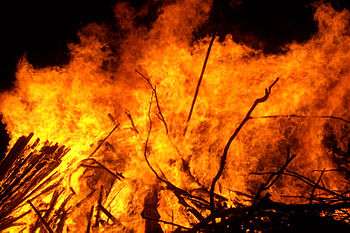Aodh (given name)
| Aodh | |
|---|---|
 | |
| Gender | Masculine |
| Language(s) | Old Irish |
| Origin | |
| Meaning | "fire" |
| Other names | |
| Pet form(s) | Ádhán, Aedán |
| Anglicisation(s) | Aidan, Aiden, Aden |
| Derivative(s) | Aodh (Ir, SG) |
Aodh (/ˈeɪ/; Scottish Gaelic: Áed; Welsh: Aed) is an Irish word of Indo-European origin, originally meaning "fire".[1] Aodh and its many variants are used today in the Irish and Scottish Gaelic languages as a given name for both sexes, although feminine forms are less varied and less common. Feminine forms of the name include Aodhnait, Aideen (various spellings), and Aodhamair. It appears in even more variants as a surname. As a surname, the root or a variant may be prefixed by O, Ó, or Ui (meaning "from" or "descendant of") or Mac or Mc (meaning "son of").
The name was originally related to an Irish god of the underworld. The masculine given name Hugh is a common anglicization, although the names are entirely etymologically unrelated.[2] (see Hughes (surname), Hughes (given name)).
It was also used in Roman Britain as a native form of the Latin name Dominus.[3]
Pet forms of the name formed with the diminutive -an include Aedán, Ádhán, and Aodhán, names which are sometimes anglicized as Aidan, Aiden, and Edan. A double diminutive is Aodhagán and its modern form Aogán.[2] Máedóc and Mogue and their Welsh form Madog are formed from the affectionate prefix mo- and the separate diminutive -og.[3]
People with the name
- Áed
- Áed Rúad, legendary High king of Ireland
- Áed mac Echach (died 575), king of Connacht
- Áed mac Bricc (died 587), bishop and saint
- Áed Dub mac Suibni (died 588), king of Dál nAraidi
- Áed Dibchine (died c.595), king of Leinster
- Áed mac Ainmuirech (died c.598), High king of Ireland
- Áed Sláine (died 604), High king of Ireland
- Áed Rón mac Cathail (died 604), king in Leinster
- Áed Uaridnach (died 612), High king of Ireland
- Áed Bennán mac Crimthainn (died 618), king of or in Munster
- Áed Dub mac Colmáin (died 641?), bishop of Kildare
- Áed Aired (died 698), king of Dál nAraide
- Áed Róin (died 735), king of Dál Fiatach
- Áed mac Colggen (died 738), king of Leinster
- Áed Balb mac Indrechtaig (died 742), king of Connacht
- Áed Muinderg (died 747), king of northern Uí Néill
- Áed Find (died 778), king of Dál Riata
- Áed Oirdnide (died 819), king of Ailech
- Áed mac Boanta (died 839), probably king in Dál Riata
- Áed of Scotland (died 878), king of the Picts
- Áed Findliath (died 879), king of Ailech
- Áed Ua Crimthainn (fl. mid-12th century), abbot of Terryglass
- Aedh
- Aedh mac Cathal Crobdearg Ua Conchobair, king of Connacht, 1223–1228
- Aedh Muimhnech mac Felim Ua Conchobair, king of Connacht
- Aedh mac Ruaidri Ua Conchobair, king of Connacht, 1228–1233
- Aedh mac Aedh Breifneach Ua Conchobair
- Áed Ua hOissín, First Archbishop of Tuam 1152
- Aodh
- Aodh, Earl of Ross (died 1333)
- Aodh Mór Ó Néill (1540–1616), Irish earl and resistance leader
- Aodh Mac Cathmhaoil (1571–1626), Irish archbishop and theologian
- Aodh Rua Ó Domhnaill (1572–1601), Irish King, Lord and rebel leader
- Aodh Mac Dónaill (Hugh McDonnell), Irish scribe
- Aodhagan, Aodhagán, Aodhán, Aogán[4]
- Aodhagan O'Neill (1959 - ) is an Irish darts player
- Aogán Ó Rathaille (1670–1728) was an Irish language poet
- Aodhán Ó Ríordáin (1976 - ), Irish politician
See also
References
- ↑ The modern word aodh meaning 'inflammation' or as a phrase with the Irish word for 'itch' (tochas), giving aodh thochais, 'burning itch' or 'urtication' - (Foclóir Gaeilg-Béarla, eds Tomás de Bhaldraithe, Niall Ó Dónaill, Dublin 1977), is clearly cognate with the original meaning.
- 1 2 Hanks, Patrick; Hodges, Flavia (2006), Hardcastle, Kate, ed., A Dictionary of First Names, Oxford Paperback Reference (2nd ed.), Oxford University Press, pp. 6, 126, 341, 399, ISBN 978-0-19-861060-1
- 1 2 Baring-Gould, Sabine & al. The Lives of the British Saints: The Saints of Wales and Cornwall and Such Irish Saints as Have Dedications in Britain, Vol. I, pp. 122 ff. Chas. Clark (London), 1908. Hosted at Archive.org. Accessed 18 Nov 2014.
- ↑ All are /ˌeɪ.əˈɡɔːn/ or /eɪˈɡɔːn/. The spelling Aogán reflects the loss of the light dha syllable, pronounced [ə], but the o may be reinterpreted as [ə] even in that spellinɡ.